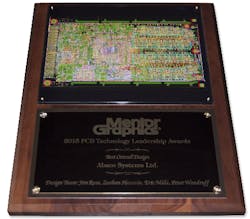Last week, the design team for the SBC347D single board computer received their award from Mentor Graphics (originally announced here) as the winner of “Best Overall Design” in Mentor’s 26th annual PCB Technology Leadership Awards. The award was presented to the team—Jim Rose, Zeshan Hussain, Eric Mills and Peter Woodruff—who are based at Abaco’s Towcester, England facility, at a celebratory dinner by Simon Vines, PCB Applications Group Manager at Mentor Graphics.
This represented Abaco’s fifth Mentor Graphics Technology Leadership Award, and second as outright winner. This year, it is believed that there were several hundred entries, and the judges comprised eight leading experts in the field of electronic design:
Michael R. Creeden, San Diego PCB CEO and founder Gary Ferrari, FTG Circuits technical support director Rick Hartley, RHartley Enterprises principal engineer Steve Herbstman, founder and lead designer, SHLC Happy Holden, Gentex Corporation (retired) Andy Kowalewski, Metamelko LP senior interconnect designer Pete Waddell, president of UP Media and publisher of Printed Circuit Design & Fab/Circuits Assembly Magazine Susy Webb, Fairfield Nodal senior PCB designer The judges, who reach their conclusions independently, have no prior knowledge of where the designs were created or by whom or which company. "Our annual PCB Technology Leadership Awards contest provides a worldwide opportunity for talented designers to showcase innovative designs. Each year we see ever increasing challenges and the use of new technologies implemented," said A.J. Incorvaia, vice president and general manager of Mentor Graphics Systems Design Division at the time of the announcement of this year’s competition. "The submissions for this contest are really quite impressive. We are expecting this year's competition to be bigger than ever, with entries from many major electronics companies, as well as from smaller teams."
The Mentor TLA contest is open to any designs created with the Mentor PCB solutions, including the Xpedition, PADS and Board Station design flows. Judging is based on overcoming complexity challenges, such as small form factor, high-speed content, design team collaboration, advanced PCB fabrication technologies and design-cycle time reduction.
About the Author

